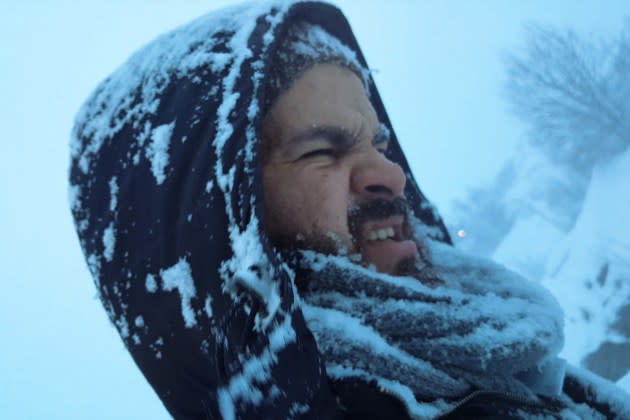‘Life Is Beautiful’ Review: An Upbeat Self-Portrait of a Palestinian Stranded in the Far North

Feel-good stories out of Gaza are not exactly plentiful at present, making “Life Is Beautiful” something of an anomaly. Though the predicament depicted — Palestinian filmmaker Mohamed Jabaly’s unplanned long exile due to closed borders and political shifts — is hardly upbeat in outline, his ebullient personality insists on emphasizing humor and warmth. Thus this chronicle of a one-month visit to Norway that drags on for seven years ends up an incongruously charming footnote to a much larger conflict that just keeps escalating. Jabaly’s doc will appeal to programmers looking for something that touches on its backgrounding issues without being “divisive.” By the same token, however, this likable first-person documentary seems almost too apolitically innocuous for this fraught moment in time.
Frizzy-haired Jabaly, who clearly has no qualms about being his own camera subject, is introduced saying “There was no film school in Gaza. … I had to learn by doing.” Attracted to the medium from an early age, he was teaching film and video at a Gaza media center by age 21. In 2013, a twin-city exchange introduces him to Hermann Greuel of the Nordic Youth Film Festival, who then invites him to visit Tromso as a guest educator. He travels to different towns in the Norwegian north, talking about his work in Gaza, giddily experiencing things utterly foreign to him — extreme cold, walking on ice, skiing, northern lights. It is a pleasant sojourn.
More from Variety
MetFilm Acquires International Rights to Icelandic Crowd Pleaser 'The Home Game' (EXCLUSIVE)
Documentary Filmmakers Discuss Viability of Industry Amidst Livelihood Crisis
Unfortunately, while Mohamed is enjoying his first taste of Europe, things back home have taken a turn. Egypt’s Rafah border crossing, “the only gateway between Palestinians and the rest of the world,” has long been problematic and frequently shut. But now it closes seemingly for good, barring our protagonist’s return.
Hermann and wife Martha are happy to let him stay under their roof, but how long that will be possible is another matter. His tourist visa expires; as his nationality is unrecognized by the Norwegian government, he gets classified as “stateless”; applying for an artist’s residency permit is complicated by his lack of a film-school certificate. This despite the fact that he is soon an award-winning director — he uses the time stranded here to edit footage from a prior emergency-medical-response volunteer stint when Gaza was under missile fire into 2017 feature “Ambulance,” which nabs festival prizes.
Jabaly appears to be much-liked in Tromso and beyond, his plight covered by local media, while colleagues protest his bureaucratic mistreatment. But the depth of any new relationships forged goes unmeasured in a film that prefers to focus exclusively on our antic, personable protagonist’s efforts to go home and/or stay put. (He has no alternative plan, though at one point he’s briefly driven to London, options in Norway having temporarily expired.) His narration is framed as a letter to his badly-missed mother. Yet we get little insight into the family and friends left behind, either, despite home movies and other mementoes scattered throughout.
Late in the going here, circumstances change once again. The director is finally allowed a Gaza City return — though by then he’s already decided he’ll continue pursuing the academic and professional paths opened to him in his Scandinavian “second home.” Unsurprisingly perhaps, yet infuriatingly, this much-delayed homecoming is stalled further by long hours of official detainment and questioning, provoking the only expressions of rage we see from Jabaly. It’s almost the sole moment here, apart from some footage from “Ambulance,” when the bitter realities of a Palestinian identity are pushed into the foreground.
The lack of more such ballasting and contextualizing material makes “Life Is Beautiful” a bit superficial — even when the stressful uncertainty of his status eventually stirs depression, Jabaly’s film doesn’t dig deep enough to be as potent as it might be. Of course, he may simply be an unusually adaptable person as well-suited as anyone could be to circumstances that might traumatize another. He certainly is ingratiating, even if after a while you might wish his movie aimed less to please than toward greater insight.
Please it does, however, with the diaristic elements of hand-held camera or Zoom calls balanced out by some very handsome views of spectacular landscapes and skies in Northern Norway. The outdoor temperatures may be Arctic, but the welcoming indoor temperament as painted by a stranded stranger here is downright toasty.
Best of Variety
Sign up for Variety’s Newsletter. For the latest news, follow us on Facebook, Twitter, and Instagram.
